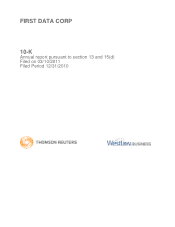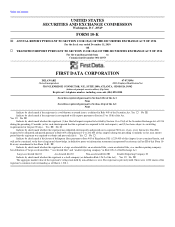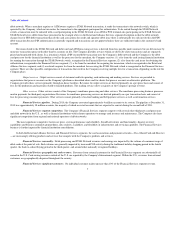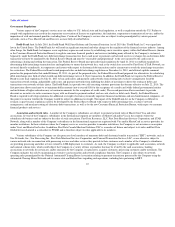First Data 2010 Annual Report Download - page 11
Download and view the complete annual report
Please find page 11 of the 2010 First Data annual report below. You can navigate through the pages in the report by either clicking on the pages listed below, or by using the keyword search tool below to find specific information within the annual report.
Table of Contents
Government Regulations
Various aspects of the Company's service areas are subject to U.S. federal, state and local regulation, as well as regulation outside the U.S. Failure to
comply with regulations may result in the suspension or revocation of licenses or registrations, the limitation, suspension or termination of service, and/or the
imposition of civil and criminal penalties, including fines. Certain of the Company's services also are subject to rules promulgated by various payment
networks, such as Visa, MasterCard and Discover, as more fully described below.
Dodd-Frank Act. In July 2010, the Dodd-Frank Wall Street Reform and Consumer Protection Act of 2010 (the "Dodd-Frank Act") was signed into
law in the United States. The Dodd-Frank Act will result in significant structural and other changes to the regulation of the financial services industry. Among
other things, the Dodd-Frank Act imposes a new regulatory regime on card issuers by establishing a new executive agency within the Federal Reserve (known
as the Consumer Financial Protection Bureau) to regulate consumer financial products and services (including many offered by the Company's customers).
Separately, under the Dodd-Frank Act, debit interchange transaction fees that a card issuer or payment card network receives or charges for an electronic debit
transaction will now be regulated by the Federal Reserve Board and must be "reasonable and proportional" to the cost incurred by the card issuer in
authorizing, clearing and settling the transaction. The Federal Reserve Board must prescribe final regulations by April 21, 2011 to establish standards for
determining debit interchange transaction fees and regulations to ensure that network fees, such as the switch fees assessed by First Data's STAR Network, are
not used, directly or indirectly, to compensate card issuers with respect to electronic debit transactions and to circumvent or evade the interchange transaction
fee restrictions. The Federal Reserve Board issued proposed rules on debit interchange regulation on December 16, 2010, and allowed a public comment
period on the proposed rules that ended February 22, 2011. As part of the proposed rules, the Federal Reserve Board proposed two alternatives for calculating
debit interchange rates both of which would cap debit interchange rates at $.12 per transaction. In addition, the Dodd-Frank Act requires the Federal Reserve
Board to issue final regulations by July 21, 2011 to ban card issuers and payment card networks from entering into exclusive arrangements for debit
transaction network routing, and prohibit card issuers and payment networks from inhibiting the ability of merchants to direct the routing of debit card
transactions over networks of their choice. The Dodd-Frank Act provides two self-executing statutory provisions that became effective on July 22, 2010. The
first provision allows merchants to set minimum dollar amounts (not to exceed $10) for the acceptance of a credit card (while federal governmental entities
and institutions of higher education may set maximum amounts for the acceptance of credit cards). The second provision allows merchants to provide
discounts or incentives to entice consumers to pay with an alternative payment method, such as cash, checks or debit cards. Finally, the Federal Reserve
Board is required to develop regulations for additional oversight of certain systemically important financial institutions and non-bank financial companies. At
this point it is unclear whether the Company would be subject to additional oversight. The impact of the Dodd-Frank Act on the Company is difficult to
estimate, in part because regulations need to be developed by the Federal Reserve Board with respect to debit interchange fees, exclusive network
arrangements, and merchant routing of electronic debit transactions, as well as by the new Consumer Financial Protection Bureau, with respect to consumer
financial products and services.
Association and network rules. A number of the Company's subsidiaries are subject to payment network rules of MasterCard, Visa and other
associations. Several of the Company's subsidiaries in the International segment are members of MasterCard and/or Visa in the countries where the
subsidiaries do business and are subject to the rules of such associations. First Data Resources, LLC, First Data Merchant Services Corporation, and STAR
Network, along with a number of the Company's subsidiaries in the International segment are registered with Visa and/or MasterCard as service providers for
member institutions. In those situations where the Company serves as a service provider to member institutions, the Company is not an issuer or an acquirer
under Visa's and MasterCard's rules. In addition, First Data Canada Merchant Solutions ULC is a member of Interac and subject to its rules and First Data
Global Services Limited is a subscriber to PULSE and is therefore subject to rules applicable to its members.
Various subsidiaries of the Company are also processor level members of numerous debit and electronic benefits transaction ("EBT") networks, such as
Star Networks, Inc., Star Processing Inc., First Data Merchant Services Corporation, and Concord Transaction Services, LLC, or are otherwise subject to
various network rules in connection with processing services and other services they provide to their customers and a number of the Company's subsidiaries
are providing processing and other services related to ATM deployment to customers. As such, the Company is subject to applicable card association, network
and national scheme rules, which could subject the Company to a variety of fines or penalties that may be levied by the card associations, banking
associations or networks for certain acts and/or omissions by the Company, its sponsorees, acquirer customers, processing customers and/or merchants. The
Company mitigates this risk by maintaining an extensive card association and network compliance function. The Company is also subject to network
operating rules promulgated by the National Automated Clearing House Association relating to payment transactions processed by the Company using the
Automated Clearing House Network and to various state and Federal laws regarding such operations, including laws pertaining to EBT.
10
























